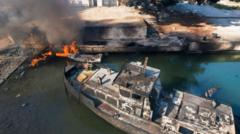The IDF declared success in its operation, which included over 350 airstrikes and attacks on various military sites in cities such as Damascus, Homs, and Tartus. The strikes were notably aimed at weapon depots and military vehicles to prevent these assets from being seized by extremist groups following the collapse of the Assad regime. In his statement, Israeli Defense Minister Israel Katz emphasized the operation's importance in safeguarding State security.
Prime Minister Benjamin Netanyahu warned Syrian rebel groups, particularly Hayat Tahrir al-Sham, against allowing Iranian forces to regain a foothold in Syria. He reiterated Israel's willingness to establish peaceful relations, but indicated readiness to respond forcefully if necessary.
Simultaneously, Turkey's foreign ministry condemned Israel's military actions, characterizing its entry into the demilitarized zone as an act of aggression during a crucial period for potential peace in Syria. The IDF has acknowledged the infringement into Syrian territory while categorically denying reports of large-scale troop movements toward the capital.
The international community remains vigilant, with the UN's chemical weapons watchdog urging Syrian authorities to secure any remaining chemical stockpiles, following long-standing concerns over the Assad regime's arsenal.
As Syria grapples with a change in power dynamics, the situation remains volatile with ongoing military actions in the region.
Israeli officials reiterated their military commitments; however, many questions remain about the long-term implications of their interventions for both Israeli security and the broader stability in Syria.
The recent developments highlight the complexity of Middle Eastern geopolitics amid shifting alliances and the enduring challenges of achieving lasting peace.
Prime Minister Benjamin Netanyahu warned Syrian rebel groups, particularly Hayat Tahrir al-Sham, against allowing Iranian forces to regain a foothold in Syria. He reiterated Israel's willingness to establish peaceful relations, but indicated readiness to respond forcefully if necessary.
Simultaneously, Turkey's foreign ministry condemned Israel's military actions, characterizing its entry into the demilitarized zone as an act of aggression during a crucial period for potential peace in Syria. The IDF has acknowledged the infringement into Syrian territory while categorically denying reports of large-scale troop movements toward the capital.
The international community remains vigilant, with the UN's chemical weapons watchdog urging Syrian authorities to secure any remaining chemical stockpiles, following long-standing concerns over the Assad regime's arsenal.
As Syria grapples with a change in power dynamics, the situation remains volatile with ongoing military actions in the region.
Israeli officials reiterated their military commitments; however, many questions remain about the long-term implications of their interventions for both Israeli security and the broader stability in Syria.
The recent developments highlight the complexity of Middle Eastern geopolitics amid shifting alliances and the enduring challenges of achieving lasting peace.




















